2024年人教版中考英语二轮复习第五讲介词学案
文档属性
| 名称 | 2024年人教版中考英语二轮复习第五讲介词学案 |
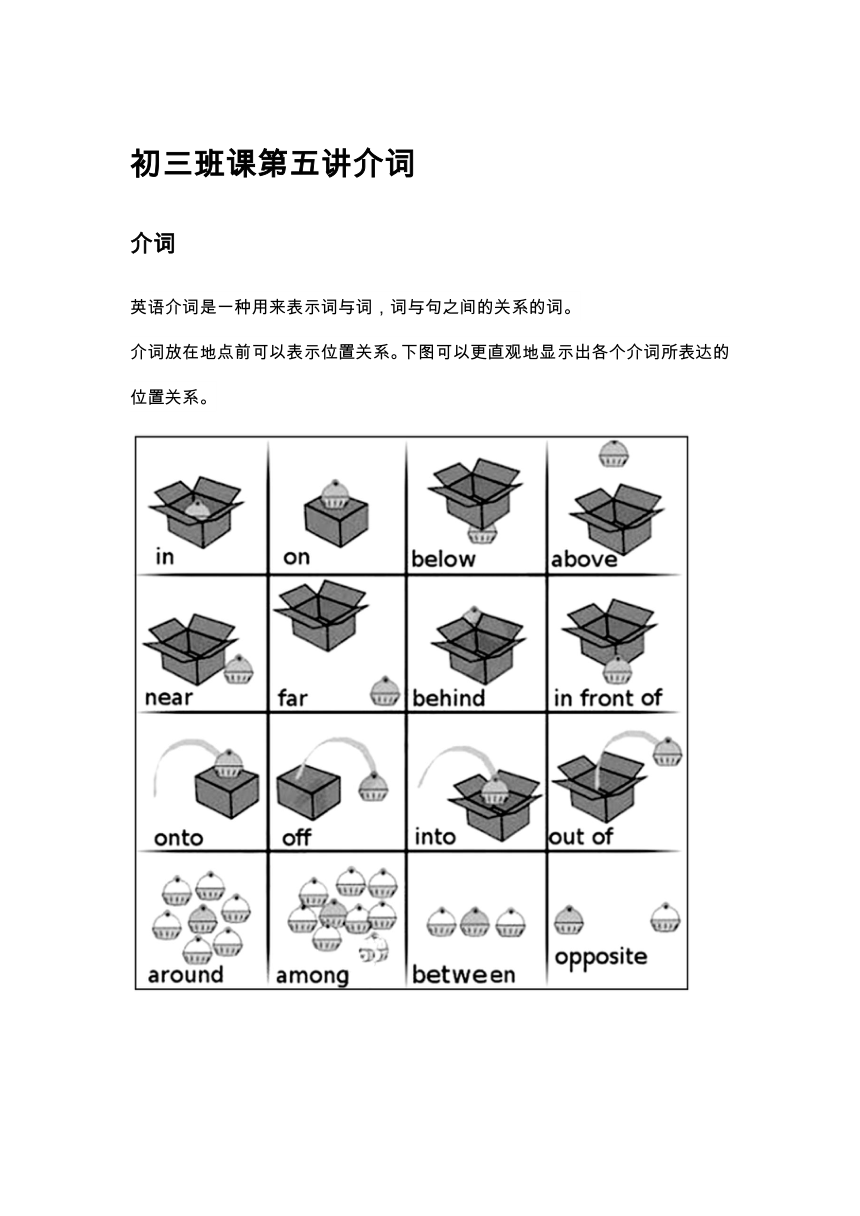
|
|
| 格式 | docx | ||
| 文件大小 | 712.2KB | ||
| 资源类型 | 教案 | ||
| 版本资源 | 通用版 | ||
| 科目 | 英语 | ||
| 更新时间 | 2024-03-21 22:07:19 | ||
图片预览

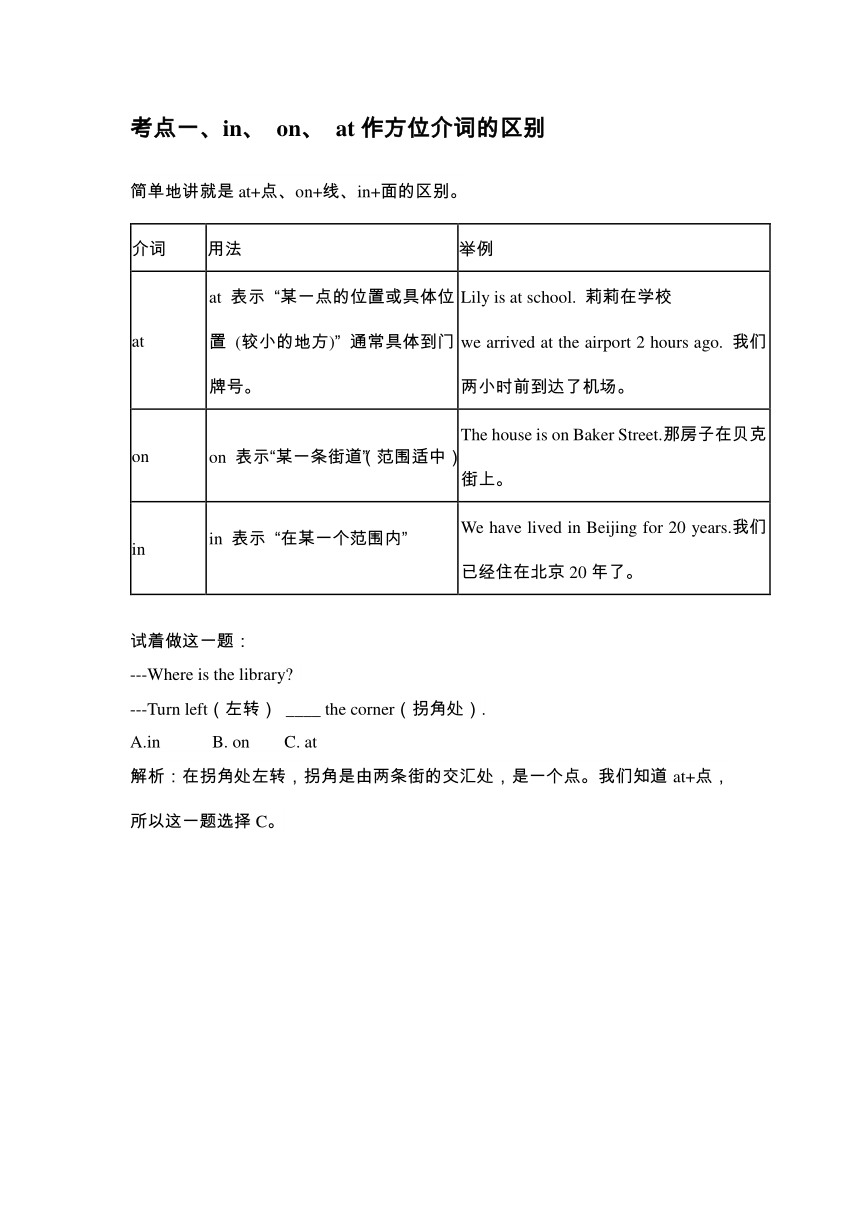
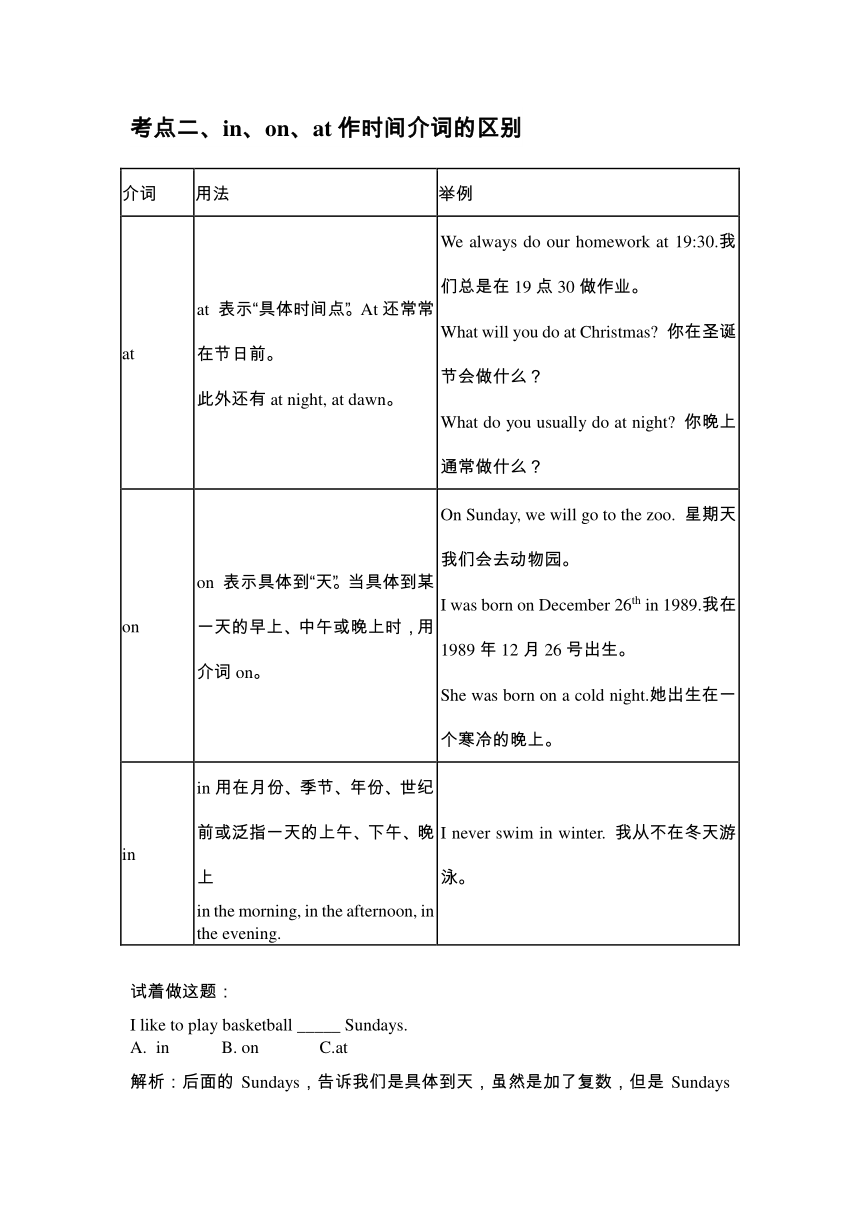
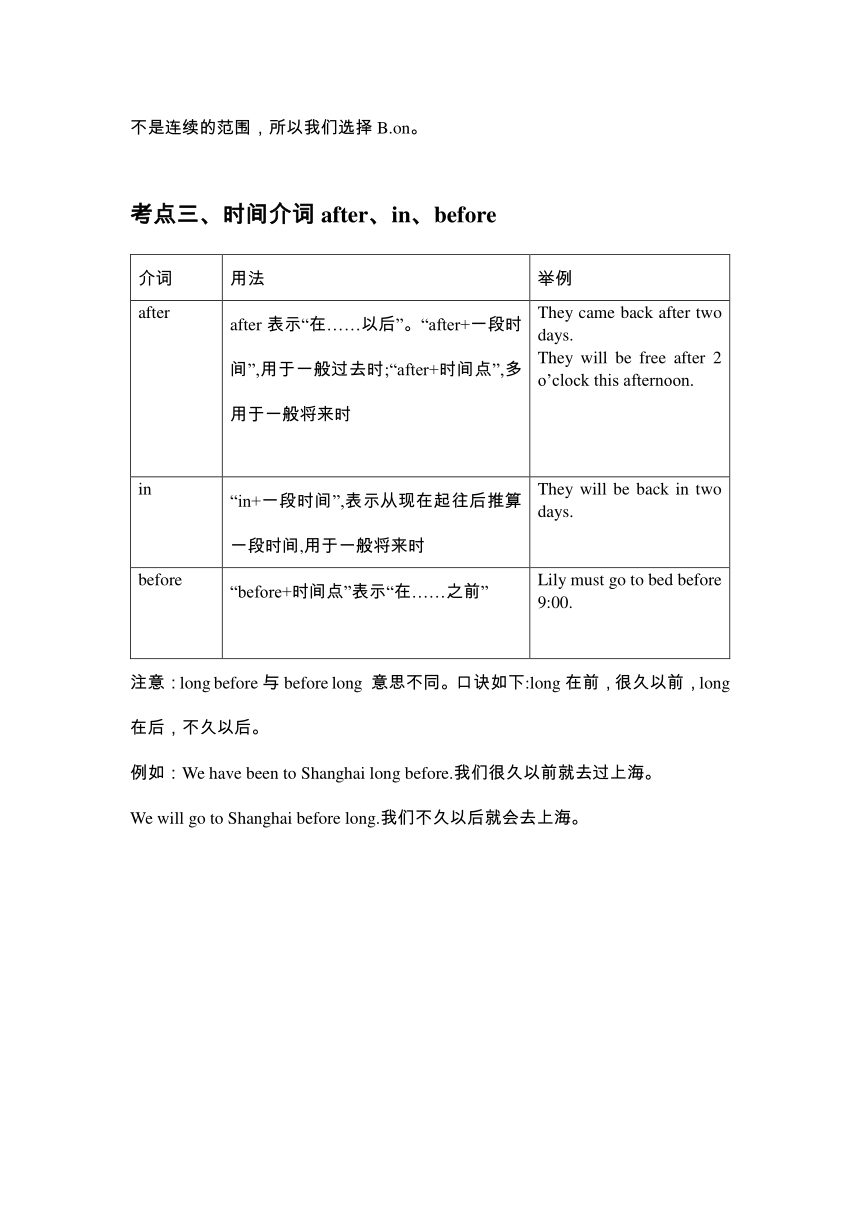
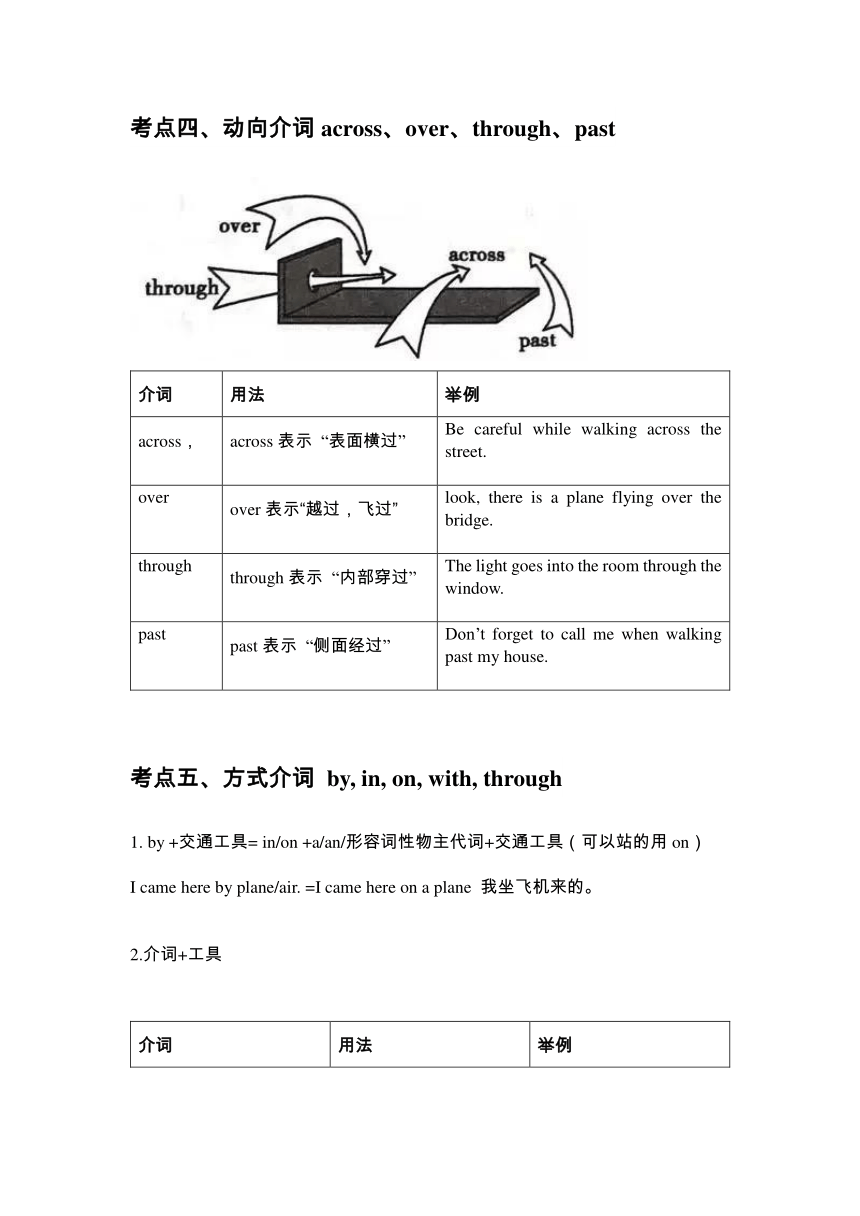
文档简介
初三班课第五讲介词
介词
英语介词是一种用来表示词与词,词与句之间的关系的词。
介词放在地点前可以表示位置关系。下图可以更直观地显示出各个介词所表达的位置关系。
考点一、in、 on、 at作方位介词的区别
简单地讲就是at+点、on+线、in+面的区别。
介词 用法 举例
at at 表示 “某一点的位置或具体位置 (较小的地方)” 通常具体到门牌号。 Lily is at school. 莉莉在学校 we arrived at the airport 2 hours ago. 我们两小时前到达了机场。
on on 表示“某一条街道”(范围适中) The house is on Baker Street.那房子在贝克街上。
in in 表示 “在某一个范围内” We have lived in Beijing for 20 years.我们已经住在北京20年了。
试着做这一题:
---Where is the library
---Turn left(左转) ____ the corner(拐角处).
A.in B. on C. at
解析:在拐角处左转,拐角是由两条街的交汇处,是一个点。我们知道at+点,所以这一题选择C。
考点二、in、on、at作时间介词的区别
介词 用法 举例
at at 表示“具体时间点”。At还常常在节日前。 此外还有at night, at dawn。 We always do our homework at 19:30.我们总是在19点30做作业。 What will you do at Christmas 你在圣诞节会做什么? What do you usually do at night 你晚上通常做什么?
on on 表示具体到“天”。当具体到某一天的早上、中午或晚上时,用介词on。 On Sunday, we will go to the zoo. 星期天我们会去动物园。 I was born on December 26th in 1989.我在1989年12月26号出生。 She was born on a cold night.她出生在一个寒冷的晚上。
in in用在月份、季节、年份、世纪前或泛指一天的上午、下午、晚上 in the morning, in the afternoon, in the evening. I never swim in winter. 我从不在冬天游泳。
试着做这题:
I like to play basketball _____ Sundays.
in B. on C.at
解析:后面的Sundays,告诉我们是具体到天,虽然是加了复数,但是Sundays 不是连续的范围,所以我们选择B.on。
考点三、时间介词after、in、before
介词 用法 举例
after after表示“在……以后”。“after+一段时间”,用于一般过去时;“after+时间点”,多用于一般将来时 They came back after two days. They will be free after 2 o’clock this afternoon.
in “in+一段时间”,表示从现在起往后推算一段时间,用于一般将来时 They will be back in two days.
before “before+时间点”表示“在……之前” Lily must go to bed before 9:00.
注意:long before与before long 意思不同。口诀如下:long在前,很久以前,long在后,不久以后。
例如:We have been to Shanghai long before.我们很久以前就去过上海。
We will go to Shanghai before long.我们不久以后就会去上海。
考点四、动向介词across、over、through、past
介词 用法 举例
across, across表示 “表面横过” Be careful while walking across the street.
over over表示“越过,飞过” look, there is a plane flying over the bridge.
through through表示 “内部穿过” The light goes into the room through the window.
past past表示 “侧面经过” Don’t forget to call me when walking past my house.
考点五、方式介词 by, in, on, with, through
1. by +交通工具= in/on +a/an/形容词性物主代词+交通工具(可以站的用on)
I came here by plane/air. =I came here on a plane 我坐飞机来的。
2.介词+工具
介词 用法 举例
in in表示使用某种语言或使用某种材料,后接语言、颜色、材料等名词,不加冠词 in English, in red,in ink.
with with表示用某种工具,表示工具的名词前必须用冠词或物主代词。 write with a pen
on on表示“以……方式”,用于手段、通讯方式等,一般指网络、电脑、电视、电话等通讯方式 on the telephone, on the radio, on TV, on the Internet.
by by表示用某种方式或手段,在名词前不加冠词,若后接动词,需将动词变为动名词形式。 by Internet, by hand, by selling flowers
through through表示“以,通过,凭借,经由” through hard work
考点六、其他介词
介词 含义 举例
for 表对象,“为,给” I want to do something for the poor kids.
表交换 I will give you 5 pens for the book.
against “靠着,倚着;对抗,反对” We played against Class 9 yesterday afternoon.
about “关于,有关;大约,接近于” I’d like to buy a guide book about Beijing.
with 表伴随;“和……一起;穿,戴” Many people like going shopping with friends。
without 表否定,“不,没有” She looked at me and smiled without a word.
as 表示 “作为,以……身份”,后面接表示职业、职务、身份的名词 He is famous as a writer.
like 表示 “像……一样”,用于说明相似关系,实际上不是 The girl looks like her father.
off 表示“离开;脱离” Keep off the grass!
except except指从整体中排除,意为 “除了…… (不包括在内)”,常与表示完全肯定或完全否定的词连用 All of us went to the zoo last Sunday except John.
besides besides指 “除了……之外 (还有)”,常与also,other,another等连用 All of us went to the zoo last Sunday besides John.
but but表示 “除了……什么也没有”,多与nobody,nothing连用 There is nothing but a bed in the room. “I love nobody, nobody but you.”
附件
动词+介词词组
动词+about
speak/talk about 谈论 think about 考虑
care about关心
bring about 引起
set about 着手
come about发生
hear about听说
worry about 担心
动词+back
keep back 隐瞒
hold back 控制住
call back 回电话
look back 回顾
give back 归还
take back 拿回
动词+down
burn down烧毁
take down 记下 cut down砍到
pass down传下来
calm down 冷静下来
settle down 安家
tear down 拆毁
break down破坏,分解
turn down 调小,拒绝
slow down 减速
put down 记下,镇压
bring down使...降低,使倒下
come down 传下,下落
动词+at
come at 向...袭击
run at 冲向,向...攻击
tear at用力撕
stare at凝视
glance at 匆匆一瞥
knock at 敲门/窗等
smile at 冲某人笑
aim at 向...瞄准
wonder at惊讶于
shout at 冲某人嚷嚷
work at 干...活动/研究
look at 看着、注视
glare at 怒视
laugh at嘲笑
point at指向
shoot at 向...射击
call at 拜访某地
动词+away
throw away 扔掉
blow away 吹走
carry/take away 拿走
clear away 清除掉
die away去世
put away 收拾起来
give away背弃
wear away磨掉,消耗掉
break away 摆脱
sent away 让走开
turn away 把...打发走
动词+for
run for 竞选
ask for请求,要求
wait for 等候
long for渴望
care for 关心,喜欢
search for 查找
call for 要求,需要
change for 用...换
apply for 申请
seek for寻找
stand for 代表
hope/wish for希望得到...
beg for 乞求
look for 寻找
hunt for 寻找
charge for收费
take for误以为...是
come for来拿,来取
leave for 离开去某地
动词+of
think of想到
consist of 由...组成
approve of证明
talk of 谈到
complaint of 抱怨
dream of梦到
speak of 谈到
die of死于
动词+from
differ from与...不同
suffer from 遭受
hear from 收到...来信
die from 死于...
keep /stop/prevent from 不让做...
learn from 向...学习
date from 始于...时候
result from 由于
separate from把...分离开
动词+ on
depend on 依靠
insist on 坚持
keep/go on 继续做...
put on 穿上
move on继续移动,往前走
feed on 以。。。为生
take on 雇佣
have on 穿着
look on 旁观
rely on依靠
carry on继续
spend on在。。。花钱
call on 拜访
live on 以。。。为生
bring on 使 。。。发展
try on 试穿
pass on 传授,传递
turn/switch on 打开
动词+ out
break out 爆发
point out 指出
pick out 选出
burst out 迸发
carry out 执行
hold out 坚持下去
keep out of使不进入,挡住
find out找出,查出
try out 试验,试用
put out 扑灭
look/watch out 当心;注意
动词+off
start off 出发
set off 出发
leave off 中断
show off 炫耀
get off下车
see off 送行
put off 延期
cut off 切断,断绝
keep off 避开
knock off 把。。。撞开
pay off 还清
get off 脱下衣服等
turn/switch off关闭
take off脱下,起飞
ring off 挂断电话
come off 脱掉,褪色
fall off 跌落,掉下
go off 走开,消失,坏掉
break off 打断
carry off携走,带走
give off 散发出
动词+in
give in 让步
bring in 引起,使得到收入
result in导致
join in参加
get in 收获,进入
fill in填写
cut in 插入
look in 来访,参观
hand in上交
drop in 拜访
succeed in 成功做某事
take in 接纳,吸收
break in 强行进入,插话 call in 召集,来访
persist in 坚持
动词+into
look into研究,调查
burst into 闯入,迸发
change into 把。。。变成
run into 碰到
turn into 变成
hand out分发,散发
run out用完
let out 泄露,发出声音
turn out生产,结果是
come out出版,出来
leave out 省略,删掉
work out 算出,想出办法
give out 散发,分发,用完
look out 当心
speak out 大胆说出
send out 发出,派遣
go out 熄灭
动词+over
turn over 翻倒,细想
go over 审阅
get over 克服
take over接管,接待
fall over跌倒
think over仔细思考
look over翻阅
run over压死,看一遍
watch over看守,照看
动词+to
belong to 属于
refer to 谈到,涉及,参考
turn to 向...求助,
see to 处理,料理
reply to 答复
object to 反对
point to指向
stick/hold/keep to坚持,忠于
come to攻击,苏醒
get to到达
bring to使苏醒
agree to 同意
supply to为...提供
add to增添
devote to贡献给
compare to与...相比,把。。。比作
write to写信给
lead to导致
attend to处理
divide into 把...分成
put/translate into 把。。。译成
动词+up
grow up 成长,长大
build up 建立
put up 搭起,安装,住宿,张贴,架起
do up 整理,包装,打扮
get up 起床
bring up抚养,提出,呕吐
stay up熬夜,挺住
sit up 熬夜
use up用完
lay up 积累
cut up 切碎
end up总结
speed up加速
clear up整理,收拾
burn up 烧毁
hurry up赶快
keep up保持
send up发射
open up开创
break up分解
give up放弃
set up建立
go up 增长,上涨
pick up拾起,学会,用车来接
turn up开大声,出席,出现
take up从事,开始学,占据
eat up吃完
tear up撕毁
make up 构成,组成
join up 联接起来
come up 上来,长出,出现
throw up呕吐
look up查找
catch up赶上
fix up 修理
hold up耽搁,使停顿
ring up打电话
divide up 分配
动词+through
get through通过,接通电话
go through审阅,检查,学习
see through识破
pull through度过危机,康复
look through翻阅,
put through接通电话
check through核对
动词+with
deal with 处理
meet with 遇到,遭受
agree with 同意某人
combine with 与...结合
talk with 与某人交流
do with 处理,需要
compare with与...相比
equip with 以...装备
cover with 用...覆盖
end with 以...结束
provide with以...供给
begin with 以...开始
supply with以...供给
play with与。。。玩
三词以上的短语动词
add up to 总计
keep away from 避开。。。
look down on 轻视
keep up with 赶上
make up for 弥补
get on /along with和...相处
get close to 接近
put up with 忍受
get out of 逃避,避免
set fire to 放火
take notice of 注意
do well in 在...方面做得好
take a photo of 拍。。。照片
make fun of 开玩笑
get used to 习惯于
keep in touch with与...保持联系
come into being形成
take pride in 为。。。而自豪
take an interest in 对。。。感兴趣
make a fool of 愚弄
take charge of 负责
make friends with ...与。。。交朋友
take part in 参加。。。
catch sight of 看见
break away from摆脱
do away with 废除
look up to 仰望,尊敬
run out of 用完
go on with 继续
look forward to 盼望
take hold of 握住
get down to认真开始
pay attention to 注意
set an example to 为。。。树立榜样
pay a visit to 拜访
take the place of 取代
make use of 利用
get into the habit of 染上。。。的习惯
get rid of 消除
keep an eye on 提防
take care of 照顾
help oneself to 随便吃用
make room for 给。。。让地方
take advantage of 利用
take pity on 可怜
play a part in 起作用
lose sight of 看不见
介词
英语介词是一种用来表示词与词,词与句之间的关系的词。
介词放在地点前可以表示位置关系。下图可以更直观地显示出各个介词所表达的位置关系。
考点一、in、 on、 at作方位介词的区别
简单地讲就是at+点、on+线、in+面的区别。
介词 用法 举例
at at 表示 “某一点的位置或具体位置 (较小的地方)” 通常具体到门牌号。 Lily is at school. 莉莉在学校 we arrived at the airport 2 hours ago. 我们两小时前到达了机场。
on on 表示“某一条街道”(范围适中) The house is on Baker Street.那房子在贝克街上。
in in 表示 “在某一个范围内” We have lived in Beijing for 20 years.我们已经住在北京20年了。
试着做这一题:
---Where is the library
---Turn left(左转) ____ the corner(拐角处).
A.in B. on C. at
解析:在拐角处左转,拐角是由两条街的交汇处,是一个点。我们知道at+点,所以这一题选择C。
考点二、in、on、at作时间介词的区别
介词 用法 举例
at at 表示“具体时间点”。At还常常在节日前。 此外还有at night, at dawn。 We always do our homework at 19:30.我们总是在19点30做作业。 What will you do at Christmas 你在圣诞节会做什么? What do you usually do at night 你晚上通常做什么?
on on 表示具体到“天”。当具体到某一天的早上、中午或晚上时,用介词on。 On Sunday, we will go to the zoo. 星期天我们会去动物园。 I was born on December 26th in 1989.我在1989年12月26号出生。 She was born on a cold night.她出生在一个寒冷的晚上。
in in用在月份、季节、年份、世纪前或泛指一天的上午、下午、晚上 in the morning, in the afternoon, in the evening. I never swim in winter. 我从不在冬天游泳。
试着做这题:
I like to play basketball _____ Sundays.
in B. on C.at
解析:后面的Sundays,告诉我们是具体到天,虽然是加了复数,但是Sundays 不是连续的范围,所以我们选择B.on。
考点三、时间介词after、in、before
介词 用法 举例
after after表示“在……以后”。“after+一段时间”,用于一般过去时;“after+时间点”,多用于一般将来时 They came back after two days. They will be free after 2 o’clock this afternoon.
in “in+一段时间”,表示从现在起往后推算一段时间,用于一般将来时 They will be back in two days.
before “before+时间点”表示“在……之前” Lily must go to bed before 9:00.
注意:long before与before long 意思不同。口诀如下:long在前,很久以前,long在后,不久以后。
例如:We have been to Shanghai long before.我们很久以前就去过上海。
We will go to Shanghai before long.我们不久以后就会去上海。
考点四、动向介词across、over、through、past
介词 用法 举例
across, across表示 “表面横过” Be careful while walking across the street.
over over表示“越过,飞过” look, there is a plane flying over the bridge.
through through表示 “内部穿过” The light goes into the room through the window.
past past表示 “侧面经过” Don’t forget to call me when walking past my house.
考点五、方式介词 by, in, on, with, through
1. by +交通工具= in/on +a/an/形容词性物主代词+交通工具(可以站的用on)
I came here by plane/air. =I came here on a plane 我坐飞机来的。
2.介词+工具
介词 用法 举例
in in表示使用某种语言或使用某种材料,后接语言、颜色、材料等名词,不加冠词 in English, in red,in ink.
with with表示用某种工具,表示工具的名词前必须用冠词或物主代词。 write with a pen
on on表示“以……方式”,用于手段、通讯方式等,一般指网络、电脑、电视、电话等通讯方式 on the telephone, on the radio, on TV, on the Internet.
by by表示用某种方式或手段,在名词前不加冠词,若后接动词,需将动词变为动名词形式。 by Internet, by hand, by selling flowers
through through表示“以,通过,凭借,经由” through hard work
考点六、其他介词
介词 含义 举例
for 表对象,“为,给” I want to do something for the poor kids.
表交换 I will give you 5 pens for the book.
against “靠着,倚着;对抗,反对” We played against Class 9 yesterday afternoon.
about “关于,有关;大约,接近于” I’d like to buy a guide book about Beijing.
with 表伴随;“和……一起;穿,戴” Many people like going shopping with friends。
without 表否定,“不,没有” She looked at me and smiled without a word.
as 表示 “作为,以……身份”,后面接表示职业、职务、身份的名词 He is famous as a writer.
like 表示 “像……一样”,用于说明相似关系,实际上不是 The girl looks like her father.
off 表示“离开;脱离” Keep off the grass!
except except指从整体中排除,意为 “除了…… (不包括在内)”,常与表示完全肯定或完全否定的词连用 All of us went to the zoo last Sunday except John.
besides besides指 “除了……之外 (还有)”,常与also,other,another等连用 All of us went to the zoo last Sunday besides John.
but but表示 “除了……什么也没有”,多与nobody,nothing连用 There is nothing but a bed in the room. “I love nobody, nobody but you.”
附件
动词+介词词组
动词+about
speak/talk about 谈论 think about 考虑
care about关心
bring about 引起
set about 着手
come about发生
hear about听说
worry about 担心
动词+back
keep back 隐瞒
hold back 控制住
call back 回电话
look back 回顾
give back 归还
take back 拿回
动词+down
burn down烧毁
take down 记下 cut down砍到
pass down传下来
calm down 冷静下来
settle down 安家
tear down 拆毁
break down破坏,分解
turn down 调小,拒绝
slow down 减速
put down 记下,镇压
bring down使...降低,使倒下
come down 传下,下落
动词+at
come at 向...袭击
run at 冲向,向...攻击
tear at用力撕
stare at凝视
glance at 匆匆一瞥
knock at 敲门/窗等
smile at 冲某人笑
aim at 向...瞄准
wonder at惊讶于
shout at 冲某人嚷嚷
work at 干...活动/研究
look at 看着、注视
glare at 怒视
laugh at嘲笑
point at指向
shoot at 向...射击
call at 拜访某地
动词+away
throw away 扔掉
blow away 吹走
carry/take away 拿走
clear away 清除掉
die away去世
put away 收拾起来
give away背弃
wear away磨掉,消耗掉
break away 摆脱
sent away 让走开
turn away 把...打发走
动词+for
run for 竞选
ask for请求,要求
wait for 等候
long for渴望
care for 关心,喜欢
search for 查找
call for 要求,需要
change for 用...换
apply for 申请
seek for寻找
stand for 代表
hope/wish for希望得到...
beg for 乞求
look for 寻找
hunt for 寻找
charge for收费
take for误以为...是
come for来拿,来取
leave for 离开去某地
动词+of
think of想到
consist of 由...组成
approve of证明
talk of 谈到
complaint of 抱怨
dream of梦到
speak of 谈到
die of死于
动词+from
differ from与...不同
suffer from 遭受
hear from 收到...来信
die from 死于...
keep /stop/prevent from 不让做...
learn from 向...学习
date from 始于...时候
result from 由于
separate from把...分离开
动词+ on
depend on 依靠
insist on 坚持
keep/go on 继续做...
put on 穿上
move on继续移动,往前走
feed on 以。。。为生
take on 雇佣
have on 穿着
look on 旁观
rely on依靠
carry on继续
spend on在。。。花钱
call on 拜访
live on 以。。。为生
bring on 使 。。。发展
try on 试穿
pass on 传授,传递
turn/switch on 打开
动词+ out
break out 爆发
point out 指出
pick out 选出
burst out 迸发
carry out 执行
hold out 坚持下去
keep out of使不进入,挡住
find out找出,查出
try out 试验,试用
put out 扑灭
look/watch out 当心;注意
动词+off
start off 出发
set off 出发
leave off 中断
show off 炫耀
get off下车
see off 送行
put off 延期
cut off 切断,断绝
keep off 避开
knock off 把。。。撞开
pay off 还清
get off 脱下衣服等
turn/switch off关闭
take off脱下,起飞
ring off 挂断电话
come off 脱掉,褪色
fall off 跌落,掉下
go off 走开,消失,坏掉
break off 打断
carry off携走,带走
give off 散发出
动词+in
give in 让步
bring in 引起,使得到收入
result in导致
join in参加
get in 收获,进入
fill in填写
cut in 插入
look in 来访,参观
hand in上交
drop in 拜访
succeed in 成功做某事
take in 接纳,吸收
break in 强行进入,插话 call in 召集,来访
persist in 坚持
动词+into
look into研究,调查
burst into 闯入,迸发
change into 把。。。变成
run into 碰到
turn into 变成
hand out分发,散发
run out用完
let out 泄露,发出声音
turn out生产,结果是
come out出版,出来
leave out 省略,删掉
work out 算出,想出办法
give out 散发,分发,用完
look out 当心
speak out 大胆说出
send out 发出,派遣
go out 熄灭
动词+over
turn over 翻倒,细想
go over 审阅
get over 克服
take over接管,接待
fall over跌倒
think over仔细思考
look over翻阅
run over压死,看一遍
watch over看守,照看
动词+to
belong to 属于
refer to 谈到,涉及,参考
turn to 向...求助,
see to 处理,料理
reply to 答复
object to 反对
point to指向
stick/hold/keep to坚持,忠于
come to攻击,苏醒
get to到达
bring to使苏醒
agree to 同意
supply to为...提供
add to增添
devote to贡献给
compare to与...相比,把。。。比作
write to写信给
lead to导致
attend to处理
divide into 把...分成
put/translate into 把。。。译成
动词+up
grow up 成长,长大
build up 建立
put up 搭起,安装,住宿,张贴,架起
do up 整理,包装,打扮
get up 起床
bring up抚养,提出,呕吐
stay up熬夜,挺住
sit up 熬夜
use up用完
lay up 积累
cut up 切碎
end up总结
speed up加速
clear up整理,收拾
burn up 烧毁
hurry up赶快
keep up保持
send up发射
open up开创
break up分解
give up放弃
set up建立
go up 增长,上涨
pick up拾起,学会,用车来接
turn up开大声,出席,出现
take up从事,开始学,占据
eat up吃完
tear up撕毁
make up 构成,组成
join up 联接起来
come up 上来,长出,出现
throw up呕吐
look up查找
catch up赶上
fix up 修理
hold up耽搁,使停顿
ring up打电话
divide up 分配
动词+through
get through通过,接通电话
go through审阅,检查,学习
see through识破
pull through度过危机,康复
look through翻阅,
put through接通电话
check through核对
动词+with
deal with 处理
meet with 遇到,遭受
agree with 同意某人
combine with 与...结合
talk with 与某人交流
do with 处理,需要
compare with与...相比
equip with 以...装备
cover with 用...覆盖
end with 以...结束
provide with以...供给
begin with 以...开始
supply with以...供给
play with与。。。玩
三词以上的短语动词
add up to 总计
keep away from 避开。。。
look down on 轻视
keep up with 赶上
make up for 弥补
get on /along with和...相处
get close to 接近
put up with 忍受
get out of 逃避,避免
set fire to 放火
take notice of 注意
do well in 在...方面做得好
take a photo of 拍。。。照片
make fun of 开玩笑
get used to 习惯于
keep in touch with与...保持联系
come into being形成
take pride in 为。。。而自豪
take an interest in 对。。。感兴趣
make a fool of 愚弄
take charge of 负责
make friends with ...与。。。交朋友
take part in 参加。。。
catch sight of 看见
break away from摆脱
do away with 废除
look up to 仰望,尊敬
run out of 用完
go on with 继续
look forward to 盼望
take hold of 握住
get down to认真开始
pay attention to 注意
set an example to 为。。。树立榜样
pay a visit to 拜访
take the place of 取代
make use of 利用
get into the habit of 染上。。。的习惯
get rid of 消除
keep an eye on 提防
take care of 照顾
help oneself to 随便吃用
make room for 给。。。让地方
take advantage of 利用
take pity on 可怜
play a part in 起作用
lose sight of 看不见
同课章节目录
- 词法
- 名词
- 动词和动词短语
- 动词语态
- 动词时态
- 助动词和情态动词
- 非谓语动词
- 冠词
- 代词
- 数词和量词
- 形容词副词及其比较等级
- 介词和介词短语
- 连词和感叹词
- 构词法
- 相似、相近词比较
- 句法
- 陈述句
- 一般疑问句和否定疑问句
- 特殊疑问句及选择疑问句
- 反意疑问句
- 存在句(There be句型)
- 宾语从句
- 定语从句
- 状语从句
- 主谓一致问题
- 简单句
- 并列句
- 复合句
- 主谓一致
- 主、表语从句
- 名词性从句
- 直接引语和间接引语
- 虚拟语气
- 感叹句
- 强调句
- 倒装句
- 祈使句
- 句子的成分
- 句子的分类
- 题型专区
- 单项选择部分
- 易错题
- 完形填空
- 阅读理解
- 词汇练习
- 听说训练
- 句型转换
- 补全对话
- 短文改错
- 翻译
- 书面表达
- 任务型阅读
- 语法填空
- 其他资料
